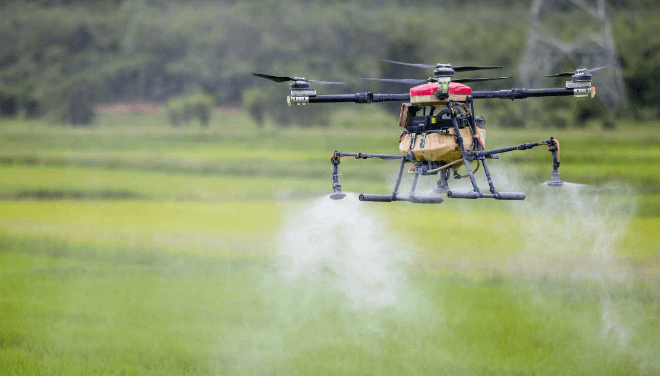8 Innovative Uses of Agricultural Drones in Auburn Alabama

Agricultural drones are transforming the farming environment in Auburn, Alabama, offering new and innovative ways to improve productivity, decrease costs, and protect the environment. These drones provide farmers with powerful tools to monitor crops, manage resources, and implement sustainable practices.
Let’s check out eight unique and innovative uses of agricultural drones in Auburn Alabama.
Precision Crop Monitoring with Agricultural Drones in Auburn Alabama
One of the most important uses of agricultural drones is precision crop monitoring. In Auburn, where crops like cotton, soybeans, and peanuts flourish, farmers need to constantly monitor the health of their fields. Traditional methods of crop inspection are time-consuming and only sometimes effective.
Drones that are equipped with high-resolution cameras and sensors can scan large fields in minutes. They provide farmers with detailed images that show the health of their crops. With this technology, farmers can detect issues like pest infestations, diseases, or water stress early. This allows them to take quick action, reducing crop loss and improving yields.
Efficient Water Management
Water management is critical in Auburn, especially during dry spells. Agricultural drones with thermal imaging cameras help farmers monitor soil moisture levels across their fields. This allows them to see which areas need more water and which are being overwatered.
With this information, farmers can adjust their irrigation systems to apply water only where it’s needed. This reduces water waste and makes sure that crops receive the right amount of hydration. Efficient water management not only saves resources but also promotes healthier crop growth.
Early Detection of Plant Diseases
One of the most innovative uses of drones is their ability to detect plant diseases before they become widespread. Identifying the early signs of disease is difficult when relying solely on visual inspections. Drones equipped with multispectral sensors, however, can detect changes in plant health that are invisible to the naked eye.
In Auburn, farmers use drones to monitor their crops for diseases or nutrient deficiencies. These drones pick up subtle changes in plant color and structure, helping farmers identify problems early. Early detection allows farmers to intervene quickly, preventing the spread of disease and saving both time and money.
Precise Crop Spraying
Crop spraying has traditionally been done using large equipment, which can lead to uneven distribution and chemical waste. Drones are changing this by providing precise crop spraying solutions. They can be programmed to spray fertilizers, pesticides, or herbicides exactly where they are needed.
In Auburn, farmers are using drones for targeted crop spraying. This reduces the amount of chemicals used, lowering costs and minimizing the environmental impact. Drones can also spray difficult-to-reach areas with precision, guaranteeing even coverage and better crop protection.
Mapping and Field Analysis
Mapping and field analysis used to require ground surveys or expensive satellite imaging. Agricultural drones in Auburn Alabama, now provide a faster and more affordable option for farmers in Auburn. These drones can develop detailed maps of fields, including topography, plant health, and soil conditions.
Farmers use these maps to make informed decisions about planting, fertilizing, and harvesting. Drones can capture real-time data, allowing farmers to monitor changes in their fields throughout the growing season. Regular mapping gives farmers the information they need to optimize their farming practices.
Livestock Monitoring
Drones aren’t just for crops. Livestock farmers in Auburn are also benefiting from drone technology. Managing livestock across large fields can be challenging, but drones make the job easier. Equipped with thermal cameras and tracking software, drones allow farmers to monitor the health and movement of their animals.
Additionally, with drones, farmers can quickly check for injuries, illness, or missing livestock. Drones also help monitor grazing patterns, making sure that animals are getting the nutrients they need. This makes it easier for livestock farmers to manage their herds and improve overall animal health.
Disaster Assessment and Recovery
Natural disasters like storms or floods can severely impact farms in Auburn. After a disaster, farmers need to assess the damage to their fields quickly. Drones provide an efficient solution for disaster assessment and recovery.
Furthermore, drones can fly over large areas and capture high-resolution images of the damage. This allows farmers to evaluate the situation and plan their recovery efforts. Whether it’s replanting damaged crops or fixing soil erosion, drones give farmers the data they need to make informed decisions and recover faster.
Supporting Sustainable Farming Practices
Sustainability is a growing concern in modern agriculture, and drones are helping farmers in Auburn adopt more environmentally friendly practices. By utilizing drones to monitor crop health and manage resources more efficiently, farmers can reduce their reliance on chemicals and conserve water.
Moreover, drones provide precise applications of water, fertilizers, and pesticides, minimizing waste and protecting the environment. Additionally, they help farmers improve soil health by identifying areas that need attention without overusing inputs. This promotes a healthier, more sustainable approach to farming that benefits both the land and the community.
Conclusion
In conclusion, agricultural drones in Auburn Alabama, are changing the way farmers manage their crops, livestock, and resources. As technology continues to advance, the possible uses for agricultural drones will only expand, providing even more opportunities for farmers to optimize their operations.
Contact Hinterland Drones and discover the latest in agricultural drone technology today!





